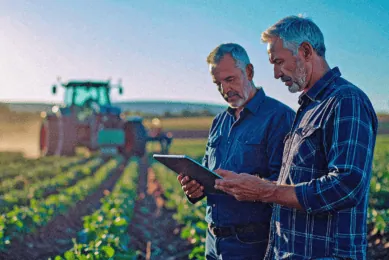WUR explores AI in greenhouse vegetable production

During the International Autonomous Greenhouse Challenge teams from all around the world will use artificial intelligence to remotely produce vegetables.
Wageningen University & Research (WUR) and Tencent will organise the 2nd edition of its International Autonomous Greenhouse Challenge in which multidisciplinary teams from all around the world will use artificial intelligence to remotely produce vegetables. The goal is to explore how artificial intelligence (AI) can produce greenhouse grown vegetables more efficiently and effectively.
24-hour hackathon
The pre-selection of the International Autonomous Greenhouses Challenge, a 24-hour hackathon, will be livestreamed on 12 & 13 September. 21 international teams have signed up for the challenge, and only 5 of them will be shortlisted for the real greenhouse growing experiment based on the results of the hackathon.
Autonomous greenhouses
From December 2019 until end of May 2020, the 5 shortlisted teams will be given each a greenhouse compartment at the Bleiswijk research site of Wageningen University & Research. They will be challenged to produce the best possible crop and highest possible yield with minimal use of resources such as energy and water and minimal human intervention with the use of artificial intelligence.
The winners of the challenge will be announced during Greentech 2020. The Autonomous Greenhouse Challenge and intermediate results can be followed online.
Text continues underneath image
21 teams to participate in Autonomous Greenhouse Challenge
21 teams with ca. 200 members of 27 nationalities will participate in the Autonomous Greenhouse Challenge. Teammembers come from familiar names in Dutch horticulture e.g. Van der Hoeven, Keygene, Hoogendoorn, Ridder Group, Delphy, 30MHz, Achmea, Tomatoworld, Syngenta, Plant Lighting. Other participants work in start-up companies or large scale companies e.g. Samsung, OMRON. And some of the participants are growers with a lot of practical experience, e.g. Greenco, T&G Global, United Farms.
Expertise in horticulture or artificial intelligence
Overall, the teams have members with expertise in horticulture or artificial intelligence. A relatively large number of BSc, MSc and PhD students are taking part in the challenge from different research institutes and universities e.g. Chinese Academy of Agricultural Science, Institute of Automation, Chinese Academy of Sciences, China Agriculture University, Peking University, UC Davis, TU Delft, University of Utrecht, Vietnam National University of Agriculture, Polytechnic University of Valencia, Kagawa University, Seoul National University, University of Ghent, Aarhus University, University of British Columbia, and of course also from Wageningen University & Research itself.
Two teams from the former challenge in 2018 participate again, AiCU and The Automators (former part of The Croperators).
Text continues underneath image
More greenhouses needed to produce food
According to WUR, in the future more greenhouses will be needed to produce food: “Autonomous greenhouses and remote digital farming can help feed more people with vitamin and mineral rich produces, increase food security and produce more vegetables with fewer resources such as water and energy. Significant advances are being made in automation, information technology and artificial intelligence (AI), which will help growers to better analyse and process information and make better decisions.”
During the 1st edition of the challenge in 2018 several AI teams showed a performance close to the human reference group, which was comprised of a team of Dutch growers. One of the AI teams was even more efficient and more productive and realized a 17% higher net profit than the grower reference group. This demonstrated the potential of AI to drive indoor farming in the future even though more developments still might be needed.
Live broadcast
The opening meeting of the hackathon, in which all teams and rules will be presented, will be broadcast live between 9:00-12:00 h on 12 September on the YouTube channel of WUR Greenhouse Horticulture. The winning ceremony, in which the shortlisted 5 teams will be announced, can be followed from 15:00-16:00 h on 13 September.
The video below shows an impression of last year’s challenge
Join 17,000+ subscribers
Subscribe to our newsletter to stay updated about all the need-to-know content in the agricultural sector, two times a week.



